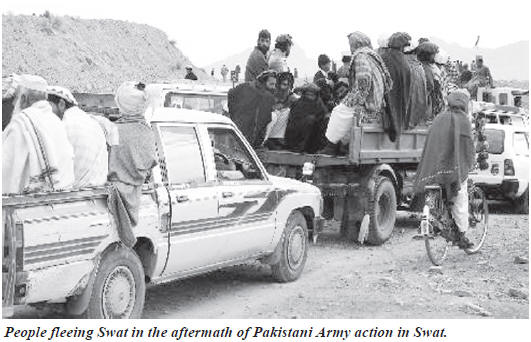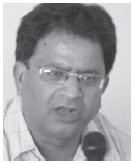The apprehensions in India that Barak Obama links the
improvement in situation in Afghanistan and Pakistan to the solution of Kashmir
problem have not died. But US governments categorical advice articulated by
Obama himself that India is not a threat to Pakistan and that Pakistan needs to
change its views about India creates a space for a new thinking on the region.
For the first time at least from a very optimistic and
theoretical point of view one can venture to debate now that the problem of
Pakistan is the nature of Pakistan itself. Unless this nature undergoes a
transformation the motor which drives the polity in Pakistan to virulent
anti-Americanism, compulsive hatred for India and voluntary embracing of Jihad,
cannot to turned off. To think that Obama meant this when he urged Pakistan to
change its outlook with regard to India is perhaps reading to much between and
into the lines.

The release of 1.5 billion dollars of aid to Pakistan at
this juncture once again pin points to the fact that USA has not as yet shunned
the suicidal expediency with regard to Pakistan which has plagued its outlook to
contain the global Islamic stridency and violence. A former advisor to Bush
Regime on weapons of Mass Distruction who lead researches tracking Pakistan's
nuclear progress from its inception categorically states," Pakistan is top of
the list. It is the number one threat to the world at this moment in time. If it
all goes off, a nuclear bomb in a US or European city. I am sure we will find
ourselves looking in Pakistan's direction."
Without generating a legitimate and vigorous introspection
into the vital and important components of the polity in Pakistan, the financial
bailout by USA only helps to nourish the vicious cycle of duplicity, deceit and
deception which the Pakistani state has practised. To believe that the Pakistan
Government and army have shunned ambivalence and duplicity and are rallying
round to decisively counter radical Islam and its military might is very
premature. To convey that the consent and compliance of Pakistani state in the
war against Al Qaeda, Taliban and Muslim international is critical to US lead
war on terror is fraught with the same consequences as has been the patronising
of the Zia-ul-Haq regime and eventually Pervez Musharraf. How many time did
President Bush describe Pervez Musharraf as 'his best friend' and the most
important 'ally' in the war against terror. These dictators always thought that
the US alliance with Pakistan was more critical than the concerns of USA on
nuclear proliferation and the imperatives of global war on terror.

Many believe that USA is fully entrenched in Pakistan, has
defanged the nuclear smuggling network run by notorious KRL from Kahuta and has
taken control of at least that command centres of the Nuclear Bomb possessed by
Pakistan. A few examples will suffice to make us re-examine our premises.
Pakistani military continued its nuclear procurements even
after the smashing of the network of Dr Qader Khan. While Musharraf was
negotiating AQ Khan's expulsions and eventual house arrest with Bush in New
York, Pakistani Military establishment was continuing with the procurement of
material related to nuclear proliferation. Asher Karni of Top-Cape Technology, a
Captown firm that imported US electronic goods to South Africa, was asked by a
Islamabad based firm which was only a front for Pakistani military, to procure
thirty-six US manufactured oscilloscopes for Pakistan, costing $1.3 million Bush
refused to raise the issue with Musharraf at Camp David on 24 June 2003. Three
days later the South African company confirmed Islamabad that they had procured
spark gaps in the US at $950 per piece. The first batch of sixty-six spark gaps
arrived in South Africa on 8 Oct, 2004. That very day Richard Armitage and
General Pervez Musharraf in Islamabad were having a discussion to finalise how
to settle the A.Q Khan issue. On October 21,2003 Humayun Khan took the delivery
of the first batch of spark gaps in Pakistan. The shipment was useless because
customs agents and anti proliferation sleuths had switched the spark gaps for
harmless components keeping the whole affair out of Musharraf's knowledge. The
entire affair came to court in March 2005 in USA. Intriguingly the US State
Department had closed down many requests to travel to Pakistan to interview
Humayun Khan, who if extradiled and found guilty could have been jailed. It was
openly reported that 'Suddenly the US government was affraid of offending
Pakistan, its partner in war on terror," During Zia-ul-Haq's time also the US
government had ambushed court cases, sealed them and those accused in smuggling
equipment and material related to nuclear proliferation were allowed to leave
USA.

General Musharraf took over the Khan's mill manufacturing
nuclear components immediately after he had made himself President,
restructuring it and transforming it into a world class facility with
extraordinary input. In 2005 Lt. General Abdul Qayum Khan, the chairman of the
mill said, "It was through Musharraf's daring, honest and visionary leadership
that we have seized the moment". What did he mean was explained candidly by
General KM Arif who had run the nuclear programme. He said about the nuclear
business and the People's Steel Mill created by Dr Qader Khan as, "We have labs
and the industry to rival the west. Once we sulked around. Now Pakistan is
producing high-frequency invertors. They used to come from the UK and now we are
selling them ourselves. Maraging steel too. Once we struggled but now finally
we are manufacturing it at People's Steel Mill and exporting it. It is better
than you can get outside". Maraging Steel is used in high quality centrifuges
used in enrichment of uranium. For Pakistan state to untemalise the view that
USA will overlook its national interests to accommodate Pakistan is not a
wishful state of mind the ground.
Proliferation experts have almost confirmed that Pakistan
has continued to sell nuclear technology even after Musharraf became the best
friend of Bush. Nobody has taken notice of the release of Dr Qader Khan from
house arrest by the Pakistani courts under the supervision of Zardari government
which has been having turbulent times and which cannot survive without the
American support. Release of Khan is an affront which USA has swallowed as it
has done many times in past to preserve its relation with Pakistan.
During the uncertainty in Pakistan caused by the lawyers
long march the former Prime Minister of Pakistan Nawaz Sharief said in an
interview to an Indian channel that, "I am not worried about happenings in Swat.
I am worried about what is happening in Baluchistan." The implications of the
statement were ignored. The statement basically reflected the dominant view in
Pakistan that does not view Islamisation and consequent radicalisation as a
threat to National Unity and progress but sees the repressed subnational urges
as the threat to Pakistan.
To see army operations in certain parts of Pakistan as a
corrective applied by the Pakistan state to change itself is erroneous and the
new US regime is perhaps committing this error. The army operations against
Taliban and non-state actors is in essence a vicious struggle for control of
power. In essence Pakistani army is seeking only to tame the non-state actors so
that they agree to work within the discipline and parameters created by
Pakistani state more specifically the Pakistan Army. The Taliban and other Non
State actors on the othre hand are exerting the pressures on Pakistani army to
conform to the dictates of Pan Islamic vision and act as its sword arm. If
Pakistani Army wins it will seek to play the determining role not only as a
frontline Muslim state but also as a nuclear Muslim state to shape the politics
which will be none other than Islamic. If Taliban and Al Qaeda win the will of
Pakistani army, will be subassumed into their will. Both ways the space for
egalitarian and moderate politics is either obliterated or exists only as a
mirage. US has been chasing this mirage to its own determinant.
When Barak Obama says Pakistan has to change its outlook with
regard to India does it mean a fundamental change in outlook or is it only
diplomatic assurance to Pakistan that India has been forewarned of any
misadventure while Pakistani Army is grappling with its internal menace.

















No one has commented yet. Be the first!